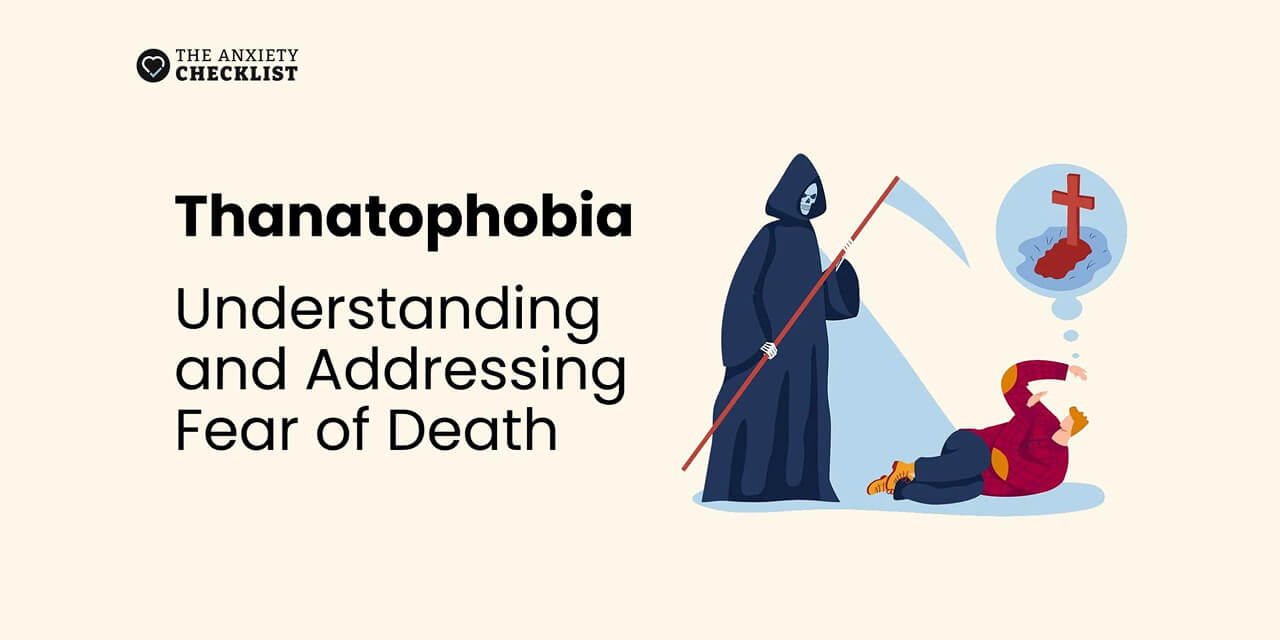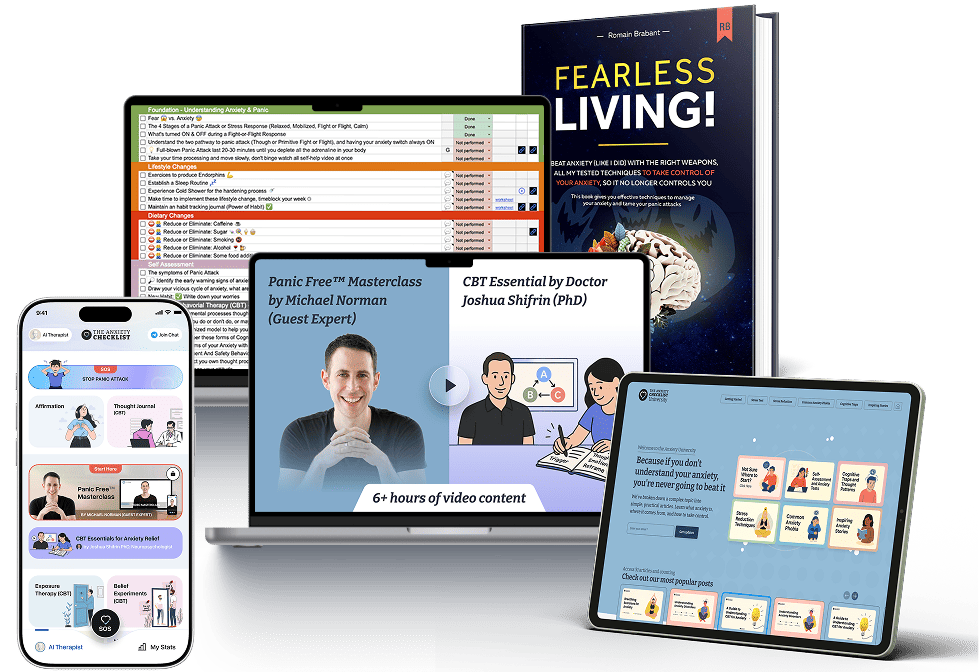When anxiety hits, do you know what to do next?
Learn how to calm your body, interrupt fear loops, and regain control step by step.
What is Fear of Death?
Death anxiety (Thanatophobia) is an intense worry or dread about dying and the process of dying. It could be the fear of your own death or the loss of someone close.
This anxiety becomes more than a passing thought when it starts to interfere with everyday life. It can cause panic, avoidance, or even physical symptoms, such as shortness of breath or rapid heartbeats.
It’s a specific type of phobia that can make talking about death feel unbearable. Additionally, the anxiety can also be rooted in broader death-related fears. This includes fear of pain, losing control, or what might follow at the end of life.
Historical Origins of the Fear of Death
The idea of fearing death isn’t a modern life anxiety cause. In early psychoanalysis, Sigmund Freud suggested that Thanatophobia masks more complex, unconscious worries rather than a direct fear of death itself.
Later, in the 1970s, Ernest Becker argued in his book, The Denial of Death, that much of human action is driven by the need to escape death anxiety, supporting the rise of terror management theory.
On the scientific side, Élie Metchnikoff founded the field of Thanatology in the early 1900s. His goal was to study death and the experience of dying, hoping that deeper insight could reduce the fear death provokes.
The Impact of the Fear of Death on Daily Life
The fear of your own death can manifest itself in many ways in your daily life. Here’s how Thanatophobia can affect your life.
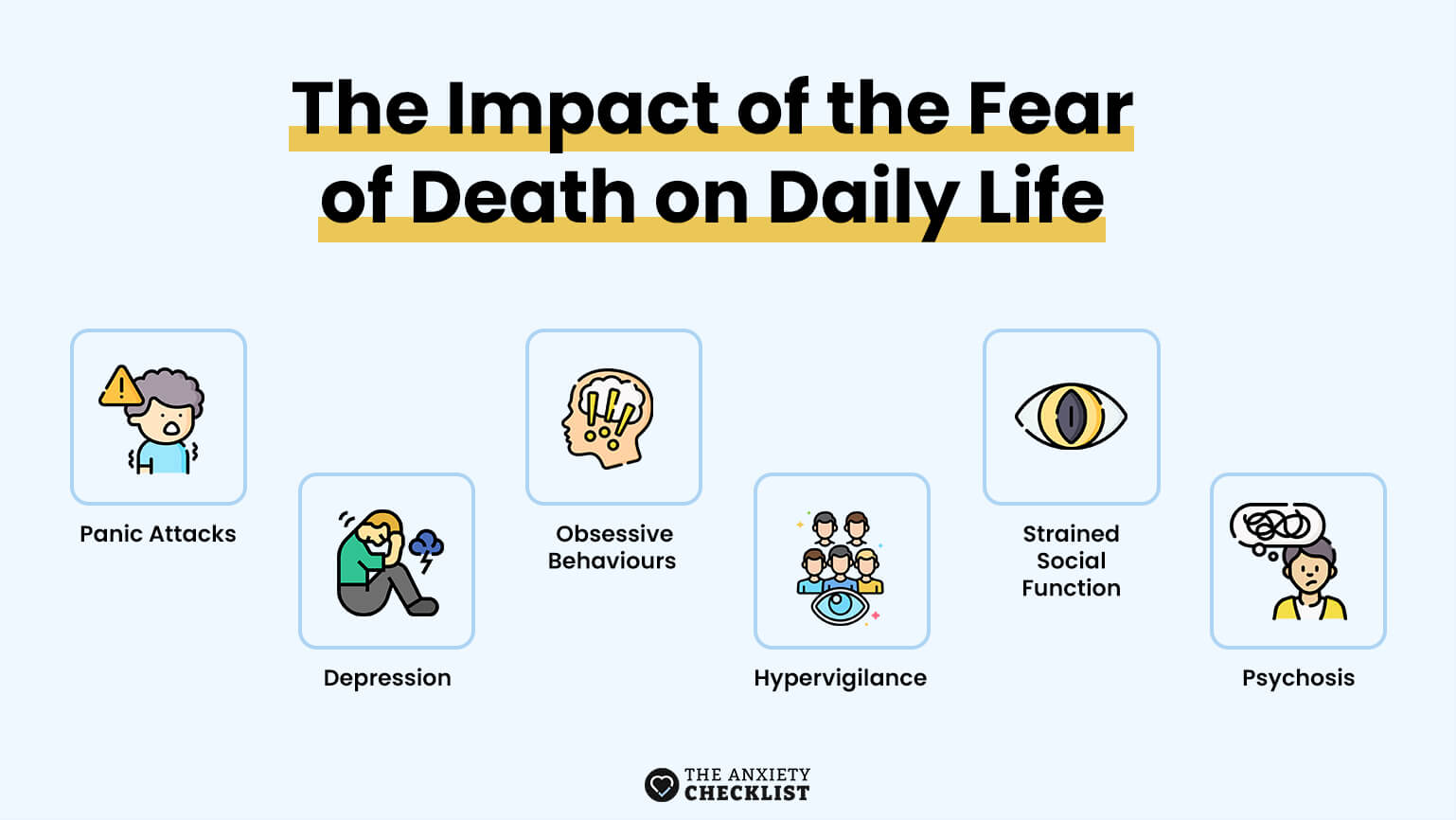
Panic Attacks
The fear of death can trigger sudden panic attacks. These moments can come out of nowhere, with a racing heartbeat, shortness of breath, and overwhelming dread.
Even if there’s no actual danger, the body reacts as if something terrible is happening at that moment. This can make simple activities, like riding a bus or sitting at work, feel unsafe.
Over time, Thanatophobia makes you avoid situations that remind you of death or anything connected to your death-related fears.
This avoidance can shrink daily routines and make the world feel smaller.
Depression
Living with constant death anxiety can also weigh heavily on your mood. The awareness that life has an endpoint may feel so overwhelming that it pulls you into sadness that lingers.
Thanatophobia can lead to withdrawal from friends, loss of interest in once enjoyable activities, and even loss of self-esteem.
Thoughts tied to the fear of death often dominate, making it harder to see possibilities for joy or hope. Over time, this cycle can feel endless unless steps are taken to treat death anxiety and its emotional effects.
Obsessive Behaviors
Sometimes, people manage their intense fear of death through obsessive behaviors. These can be constant health checks, repeated doctor visits, or endlessly searching for reassurance that they’re not sick.
Your mind starts to find solace in routines that offer safety, but the relief is usually short-lived.
Instead of calming the extreme fear, an obsessive-compulsive disorder like this can make Thanatophobia stronger. The brain keeps asking for more reassurance, trapping the person in a cycle of fear, death thoughts, and more compulsive responses.
Strained Social Functioning
Death-related fears can also cause social anxiety and tension in human interaction. Thanatophobia may pull you away from family and friends because conversations or gatherings stir up anxiety.
You may start feeling misunderstood, deeply believing that the people around you don’t grasp the weight of death.
This strain can leave a person feeling isolated. The absence of close support makes the fear more intense, which then leads to more avoidance.
Hypervigilance
The fear of death can also create hypervigilance. This is a situation where you are constantly overthinking about dying or scanning for signs of danger.
Your body stays in a state of alertness, making even harmless sensations or everyday noises feel threatening. This heightened awareness drains energy.
One area of your life that can suffer most due to Thanatophobia is sleep. Concentration also becomes harder, and small tasks feel overwhelming. There’s never any room for calm moments or genuine relaxation.
Psychosis
In more severe cases, untreated fear of death can contribute to breaks from reality, sometimes leading to psychosis. Your thoughts may become distorted, with overwhelming beliefs about dying.
Living with psychosis tied to death anxiety can disrupt every part of life, including work, relationships, and personal safety.
You may struggle to separate fear-of-death thoughts from reality, which can be frightening for the people around you.
This is one of the strongest reminders of why it’s important to treat death anxiety and seek proper help.
To help you understand the dangers of fearing death, here is a short TEDTalk by Richard Holm who has overcome his fear of death after being diagnosed with a pancreatic cancer:
Factors Contributing to Fear of Death
People experience death anxiety daily, and below are some of the top contributing factors.
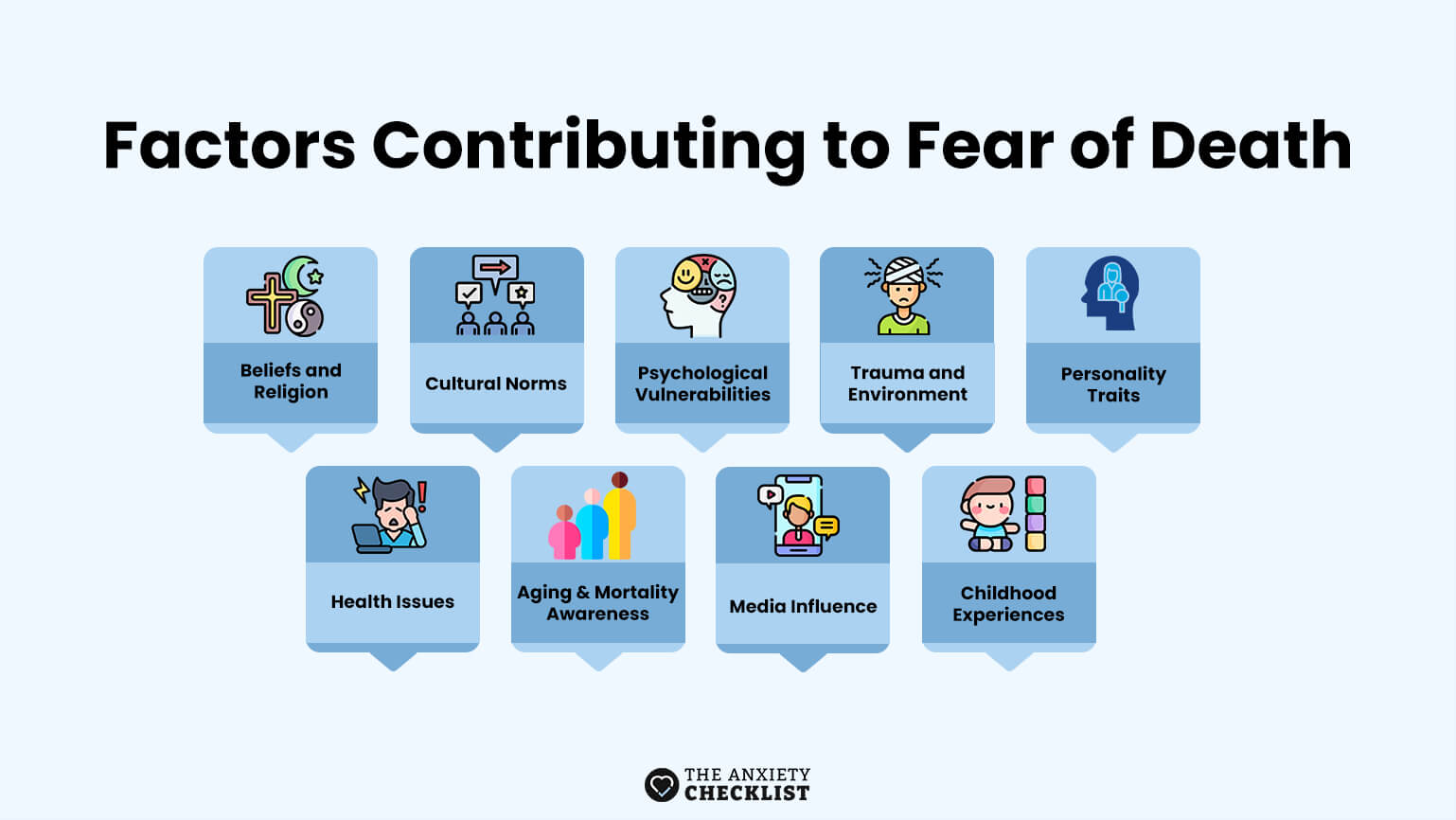
1. Beliefs and Religion
What you believe about life and what comes after can deeply shape how you see death. If your faith teaches the idea of punishment or uncertainty after death, it can make your fear of death worse.
On the other hand, even beliefs that promise comfort can still leave you feeling uneasy if you’re unsure where you stand with death concerns.
If you feel pulled between what you’ve been taught and what you personally believe, that inner conflict can turn into death anxiety that lingers in your daily life.
2. Cultural Norms
Culture also plays a huge role in shaping the fear of death. Some cultures avoid the topic altogether, treating it as something you shouldn’t talk about. That silence can make your Thanatophobia feel heavier.
There are also cultures where the topic of death is addressed more directly, sometimes through rituals or open grieving.
Depending on how you grew up, the way your community spoke about death might have planted the seeds of fearing death. If it was avoided or painted as something terrifying, it’s natural that your mind carries those messages into adulthood.
3. Psychological Vulnerabilities
If you already live with anxiety or certain mental health struggles, you may be more susceptible to thoughts about mortality and Thanatophobia.
The mind tends to latch onto the biggest unknowns, and death is one of them. This can make the fear of death feel bigger than any other worry.
This vulnerability doesn’t mean you’re weaker, but it does explain why death anxiety might hit harder for you than it does for others.
4. Trauma and Environment
If you’ve lived through trauma, the fear of death can feel heavier. Traumatic experiences or generational trauma often make life feel unpredictable, so mortality becomes a constant background worry.
For example, losing someone suddenly or surviving a dangerous event can bring Thanatophobia to the surface.
Your environment also matters. Growing up or living in unsafe surroundings can make the fear-death cycle stronger.
If your body and mind have learned to expect danger, death anxiety can become a way your brain tries to prepare you, even when no threat is present.
5. Personality Traits
Certain personality traits can also add to the fear of death. For example, if you’re a perfectionist, the idea of things being unfinished can make mortality especially stressful.
High levels of neuroticism can also fuel death-related fears. If your mind naturally leans toward worry, it’s easier to get stuck on Thanatophobia and harder to let go.
Personality doesn’t cause death anxiety on its own, but it can shape the way fear grows inside you.
6. Health Issues
Living with chronic illness or poor health often makes the fear of death more pressing. Each symptom can trigger fear-death thoughts, as if the body is constantly reminding you of your limits.
Even minor health issues can feed into things like hypochondria (illness anxiety disorder), where every small sensation feels like a threat.
This link between the body and mind means your health can easily become a source of anxiety. Which is why, when you’re already anxious, every ache can feel like proof of something worse, making death-related fears much stronger.
However, you can feel reassured by following a healthy lifestyle and keeping your habits in check.
7. Aging and Mortality Awareness
As you grow older, the awareness of mortality becomes harder to ignore. Sometimes it's because of a chronic or incurable illness or seeing your peers age or pass away that brings the fear of death into sharper focus.
These experiences are a constant reminder that time is moving forward, and the body is changing.
For some, this reflection is gentle, but for others, it leads to a sharp rise in Thanatophobia that becomes hard to push aside.
8. Media Influence
You are what you consume, so the constant flow of news about accidents, disasters, and violence can fuel death-related fears.
When you’re already sensitive to mortality, seeing these stories repeated can make the world feel unsafe. Even simple movies and shows that show violence can trigger Thanatophobia.
9. Childhood Experiences
Early experiences with loss can also leave lasting effects. If you lost a parent, a pet, or even witnessed death at a young age, the fear of death may have rooted itself early.
And since children lack the tools to process such loss, Thanatophobia can remain unaddressed into adulthood. Even without direct loss, growing up in a family where death was treated with silence or fear can shape how you see it today.
However, inner child healing is a way to cope with childhood traumas but you need to be self-aware so that you opt for healing therapies.
Otherwise, these early lessons become part of your emotional memory, creating death anxiety that follows you into later years.
How to Deal With Anxiety Caused by the Fear of Death
Death anxiety may feel unshakeable, but there are solutions you can try to manage it and recover from anxiety. They include the following.
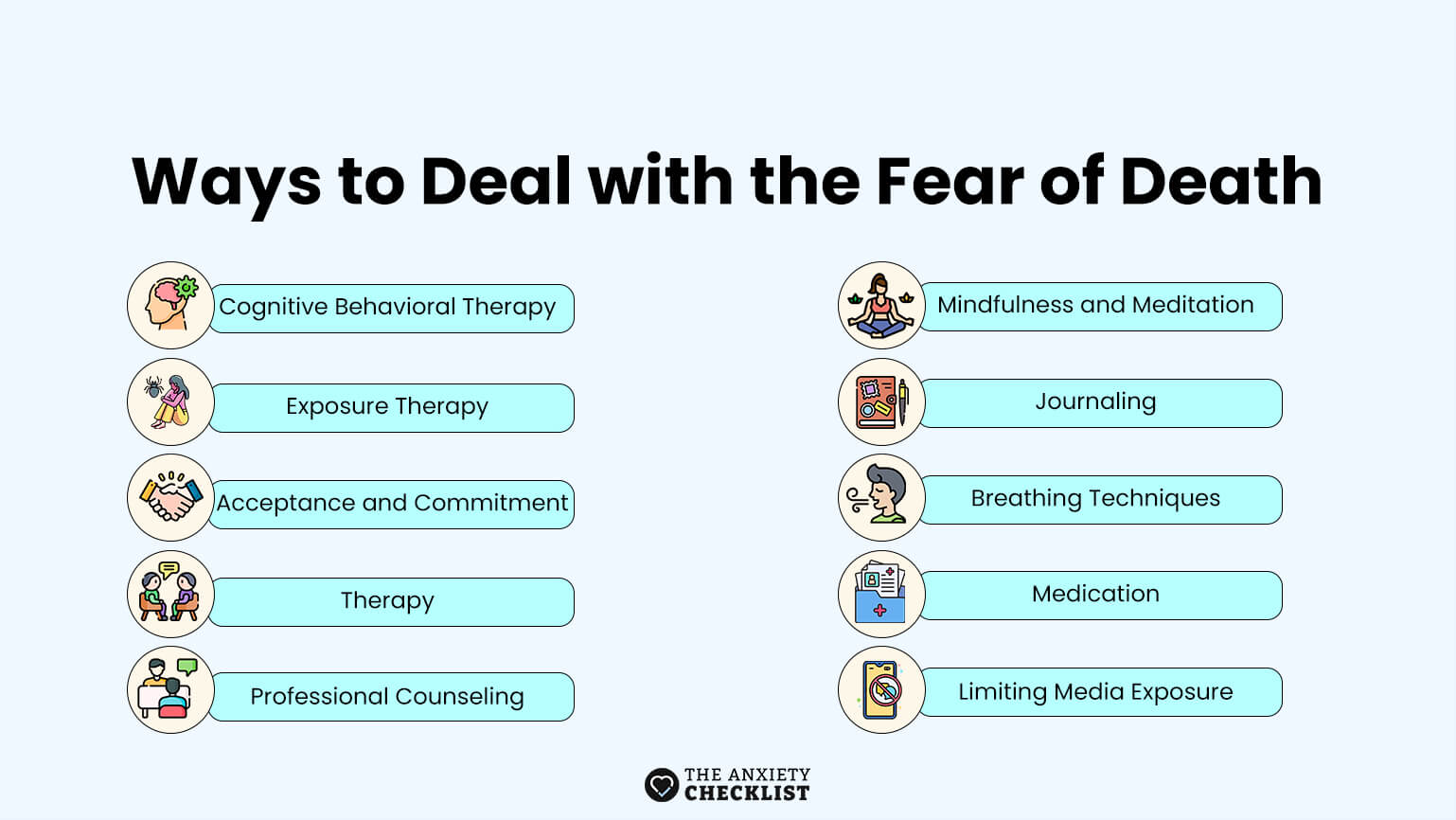
Frequently Asked Questions
Fear of death can be triggered by many things, and it’s not the same for everyone. For some, it comes from health scares or the loss of loved ones.
For others, Thanatophobia may be linked to religious beliefs, cultural attitudes, or traumatic experiences.
The seven fears of death are often described as:
Manage Your Fear of Death Today
Previous Article
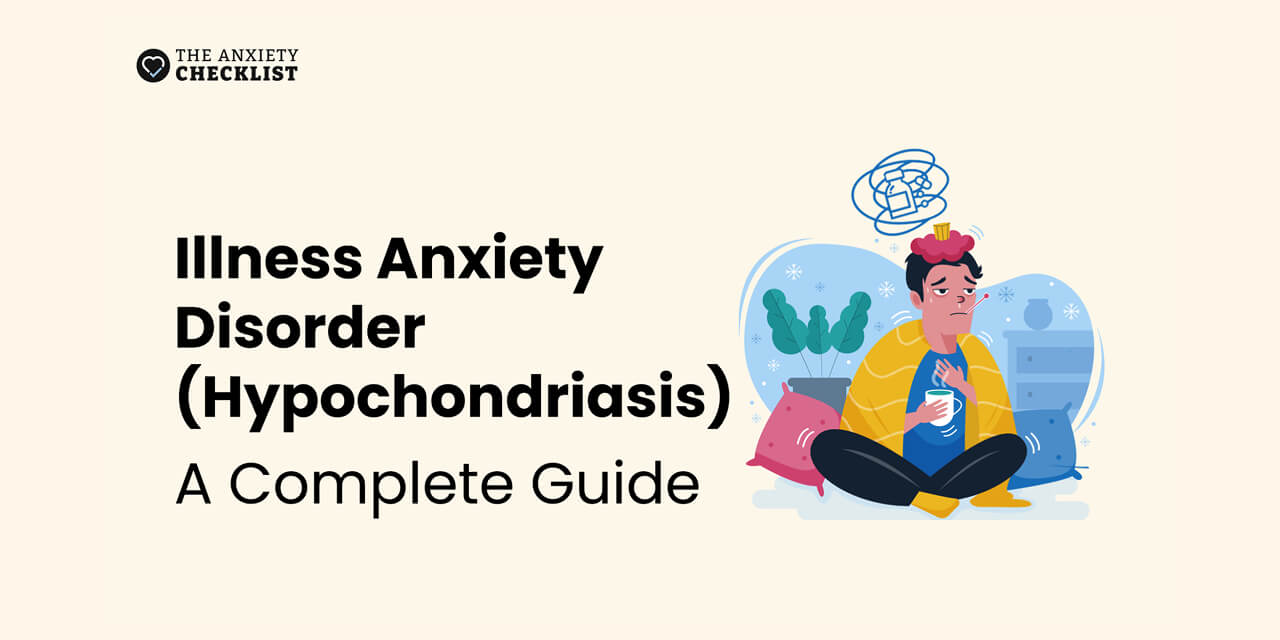
Illness Anxiety Disorder (Hypochondriasis): A Complete Guide
Next Article
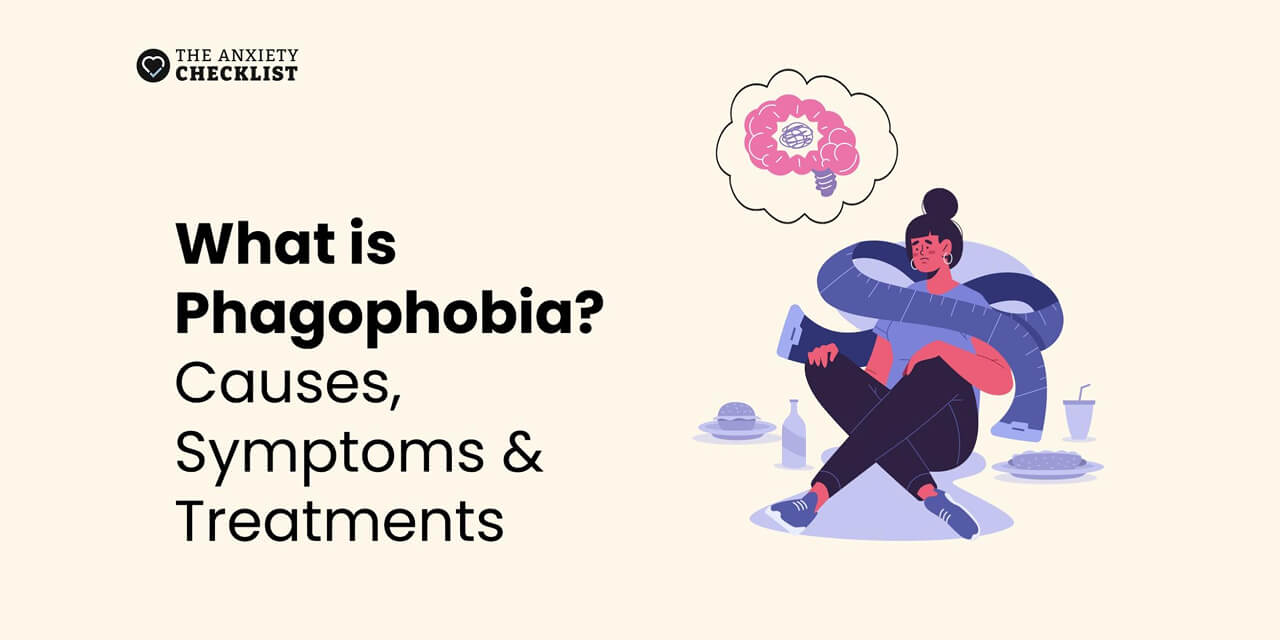
What is Phagophobia? Causes, Symptoms & Treatments
If you are in a crisis or any other person may be in danger - don't use this site. These resources can provide you with immediate help.


